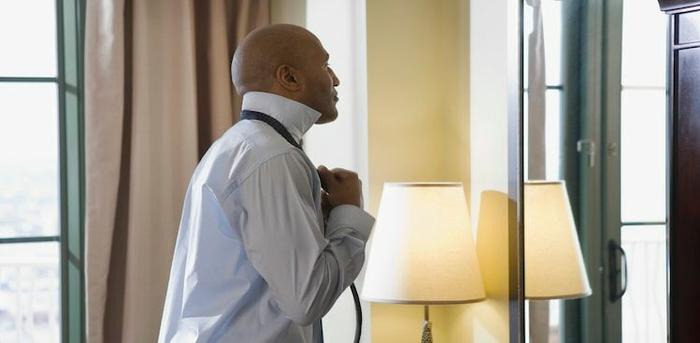
Picking an outfit for your job interview can be a challenge. (That, and knowing what questions you should be prepared to answer, of course.) After all, if you want to set yourself up to do your best, you’ll want to look your best, too.
But what if you have no idea what to wear?
Not every job interview requires you to wear your special-occasion tie and a polished pair of shoes. In fact, doing so might reveal that you haven’t done your research. So before you dust off that suit, know that your outfit will depend heavily on the company culture and the kind of work you’d do there.
I connected with Muse career coach and founder of The Hired Group Ryan Kahn and Samari Majerus, who runs talent management at Knot Standard, to learn more.
Step one, says Kahn: “Get to know the company you’re applying for.” Research the company by looking at their social media platforms and company careers page. Typically, you’ll get a vibe for what people wear to the office. Or, ask someone you know who works there. If that doesn’t provide results, err on instinct—what do people in this industry typically wear to work?
Step two: Plan on dressing slightly nicer than everybody else. “If the company’s culture is to wear shorts and a t-shirt, you’ll do something one-up from there,” says Kahn.
Step three: Get a little inspiration by checking out this cheat sheet I’ve put together below. It’ll help you know exactly which clothes to pull out of your closet the night before your job interview.
Business Formal
You’ll likely want to wear business formal if you’re interviewing at a more traditional or old-fashioned company. In addition, for any job where you might be working with important clients or be the manager of a large team, this is usually a safe bet.
Business formal dress is exactly what you think it is—a suit. Plan on basic business colors: black, navy, brown, and gray. You don’t want to do anything too crazy (like wear bright colors or distracting patterns). Majerus also says you can jazz it up with a “pocket square and a nice pair of loafers or lace up shoes” if you’d like.
Business Casual
You’ll want to wear business casual clothing if the office seems a little less formal than a suit and tie, but people aren’t running around in ripped jeans. Wear a button-down shirt or nice sweater that shows you still mean business…but you can “lose the tie,” says Kahn.
This is also your chance to whip out a more fun item of clothing—like a pair of colorful socks, for example—for some (subtle) personality.
Smart Casual
You’ll want to wear smart casual if it’s a really small company or startup and you feel 100% sure that this is the right look.
For this, you can go with tailored jeans, a crisp shirt, and nice, clean sneakers.
I hate that I have to say this, but I’d avoid shorts, tank tops, flip flops, and hats—no matter how hot it is.
The key is to remember that this is an interview first and foremost, meaning you want to put yourself in the best possible light right away—so you can never go wrong leaning on the over-dressed side.
And, says Kahn, “When you’re looking for a job, this is a good time to pamper yourself. Invest in yourself—get that haircut or that clean razor, whatever makes you feel like your best. When you feel really good about yourself, that translates into walking through the door, and it’s going to pay off for you.”
As Majerus states, “if you feel good in your outfit, you can focus on what is important—the interview.”